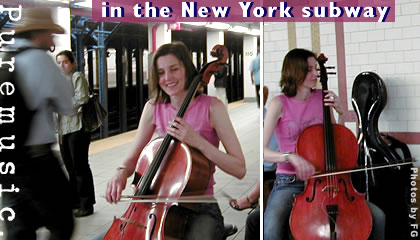
A Conversation with Stephanie Winters
Puremusic: So, Through the Storm--we're very, very excited about this classical crossover record you've created. We really think it's fantastic.
Stephanie Winters: Thank you.
PM: In order to understand how, why, and when you set out to do what you've done here, I'm sure we should go back a little ways to what seems to me a very funny word this morning, your upbringing?
SW: Okay. [laughs]
PM: What was your upbringing all about? How many kids, and where did it take place?
SW: I grew up in Levittown, Long Island, the track housing suburb, post World War II.
PM: Right. I lived in Levittown, PA, for some years.
SW: Oh, really?
PM: Yeah. Where you never have to ask your friend where the bathroom is, it's the same place it is in your house.
SW: Right, exactly.
[laughter]
SW: I have an older brother, and I was pretty much raised by a single mom. I had a pretty unconventional upbringing--for working class suburbia. [laughs] [I surely wish I could aptly describe this laugh--it's great, one of those lower, kind of monotonal deals, you know?] My mother was going to art school when I was growing up. And my father was--is a professional musician, so I guess that's where the music talent came from.
PM: Right. It was in the genes.
SW: Yeah. And my brother was extremely naturally talented. He wrote the first cut on the CD.
PM: Ah, I wondered if that was your brother or your dad.
SW: Yeah, my brother. So I wanted to play an instrument because my brother excelled at it, and I thought maybe I'd be good at it. I started on the clarinet, and that didn't work out. And I went to the string teacher and I was given the cello because I was tall.
PM: I'm so glad the clarinet didn't work out.
SW: Yeah, me too. [laughs] That was a real gift. In the summers, my brother and I would go visit my father in Detroit, where he was gigging. He taught school--music, he was the band teacher--but he gigged nights and weekends. And we would go in the summer when he was just gigging, and we'd go to the nightclubs. I was like eight, nine years old and I'd be at the nightclubs.
PM: Wow. What kind of music would your dad be playing?
SW: His name is Alfred Winters--though when he played with Benny Goodman in New York he was known as Jim Winters. He's a trombonist, and he played a lot of jazz, big band and Dixieland. He was a freelancer and a bandleader, so he played with varied touring acts at the time, including the whole era of Vegas-type shows. He played with Sammy Davis Jr., Sonny and Cher, Jackie DeShannon, Nancy Sinatra and other high profile nightclub acts. On the other hand, he brought a lot of major players in to perform with his band. He worked with Coleman Hawkins, Gene Krupa and cornetist Bobby Hackett. There are a pair of records out there with Gene Krupa and Bobby Hackett playing in his band. He also had his Dixieland band. I remember going to the Bix Beiderbecke Jazz Festival. So I had this single mom in Levittown going to art school, and then my father, who I only saw briefly in the summer.
PM: Was he a Bohemian?
SW: My father?
PM: Yeah.
SW: No, because he had the teaching job. But he had a home studio back in the 60s.
PM: Indeed.
SW: He was really into his music. I guess on some level it gave me--I don't know what to call it, some sort of mental picture of being a musician. What was weird for me was that I was in a classical world. I came from a very working class family. My uncle was a sanitation worker and my grandfather was a fireman. When I started getting serious about the cello, I was this classical musician who didn't have any role models within my family for that world–my brother was more in the jazz world and my father was in the nightclub world.
PM: But at least you had knowledge of other worlds.
SW:
Yes. And my mother used to take me to museums because she was going to
school. She didn't have any money, so sometimes I went to class with her.
I remember going to a drawing class where I'd sit there and they'd have
the naked model and my mother would be drawing. And she'd drag me into
the city to go the museums. I guess both parents made it sort of okay
to be a struggling artist, and in a way that's all I knew. continue
print (pdf) listen to clips puremusic home